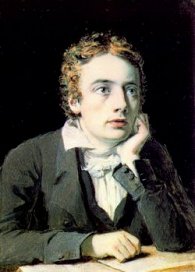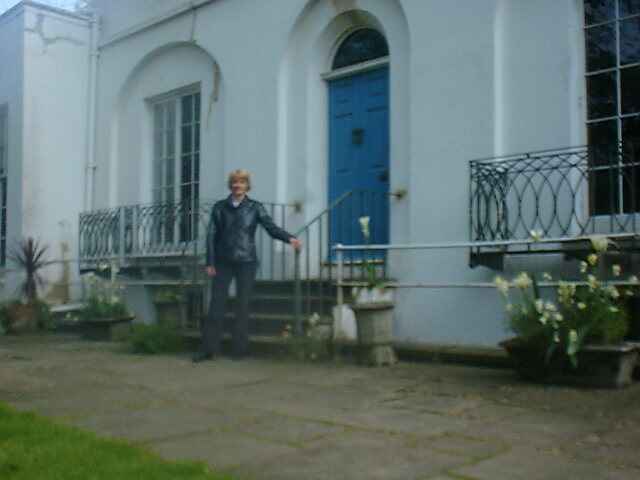
|
 |
"I think I shall be amongst the English poets after my death" Keats wrote in one of his letters. I go further and declare him the greatest of the English poets.
In his short and troubled life, this young man wrote poems of exquisite beauty and developed his own carefully worked-out and sensible philosophy.
When he died on 23rd February 1821, well "before my pen has gleaned my teeming brain", he was aged just 26, which makes the depth and brilliance of his work all the more amazing.
"A thing of beauty is a joy forever" - thus runs the first line of his epic 'Endymion'. Read any poem by John Keats, and nod in agreement!
NB. Highly recommended are two books by Robert Gittings - a biography 'John Keats' and 'The Letters of John Keats'.
In the afternoon the sun comes out and Hampstead is at its most beautiful - Keats wrote "To a Nightingale" in a Hampstead May.
Well Walk where John nursed his brother Tom and watched his slow death from tuberculosis, is a pleasant, leafy street but the actual house (no. 1) seems to have been demolished, there being a significant gap where it must have stood. Think of Keats stricken with the onset of TB himself, standing in tears at the end of the street unable to pass the house where his brother died.
Wentworth Place, an elegant white Regency building standing in a small but well-planted garden, basking in the sunshine. A plaque above the door simply states that John Keats - poet - lived here, and another beneath a plum tree that this was where he wrote "Ode to a Nightingale".
Hard to imagine such sublime words being written one May morning perhaps just where my feet now stand - cannot associate myself with such greatness. Inside, we are the only visitors and the house is settling into a late afternoon hush. Blackbirds sing out in the garden and a clock ticks calmly.
Brown's copy of "Endymion", with words underlined in pencil and a lyre drawn on the inner leaf. Keats' much-read books, a lock of dark brown hair, another lock faded through illness.
Upstairs in Fanny Brawn's bedroom a garnet engagement ring (which she wore till death), a braid of hair, bracelets, necklaces. Try to picture this eighteen year old ("my sweet girl") who captured the heart of a poet. Was she sometimes cruel to him? All pretty girls are cruel at eighteen. "Be like an April day" he said when she left for a dance, "Smiling and cold and gay", hoping that she would "Save a warmer June for me".
A life mask beside a death mask - we are invited to compare. One face of hope, one of resignation? The bedroom Keats stumbled into on that fateful night - "That drop of blood is my death warrant".
I am standing here in this space I think, where he once stood - only the years separate us now. Did Keats feel this way when he visited Burns' cottage? Perhaps he did when he wrote
"This mortal body of a thousand days
Now fills O Burns a space in thine own room,
...
Fancy is dead and drunken at its goal;
Yet can I stamp my foot upon thy floor,
Yet can I ope thy window-sash to find
The meadow thou hast trampled o'er and o'er,
Yet can I think of thee till thought is blind,
...."
Back outside, sunshine and bird song - pause for a photograph by the front door. Almost feel Brown, robust, hearty, striding past me into his house. Fanny Brawn gracefully trips inside, a rustle of muslin, a hint of lavender. And the small dark-haired young man with the book under his arm who turns from the doorstep to survey the spring garden....
"The fancy cannot cheat so well as she is famed to do" and the rattling tube train trundles us away from our "waking dream".
